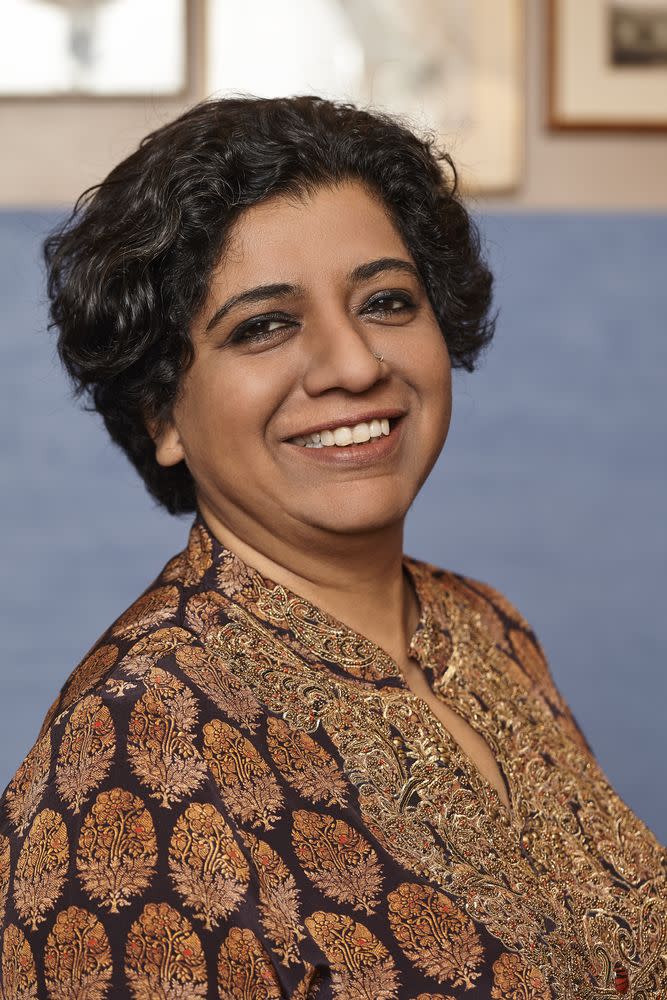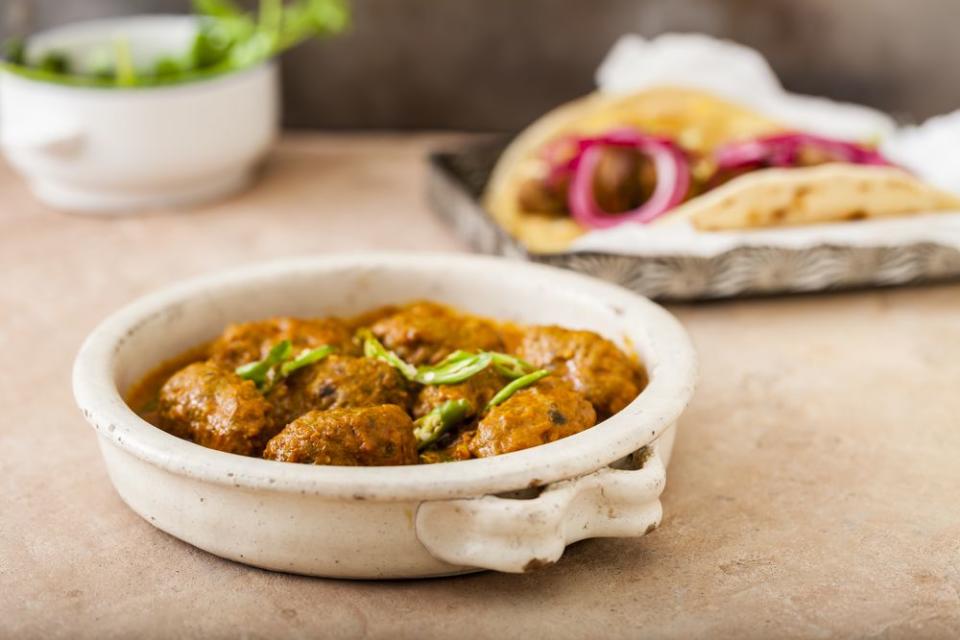London’s Cult-Favorite Indian Restaurant Is a Love Letter to Second Daughters
Asma Kahn has a law degree but no culinary training. Everything she learned to cook—prawn malaikari, venison kofta, fluffy fried puri—she learned from women in her family, though much later in life. In fact, it wasn’t until enduring a hellish winter in Cambridge, where her husband was a professor, when she felt inspired to return home, to Calcutta, to learn the recipes of her mother and aunts and cousins.
“I felt that I was drifting,” Khan tells me at Darjeeling Express, her smash hit Soho restaurant in London, which has been open for less than a year but is already essential. (A second location is due to open soon, per Khan’s Twitter, that will celebrate Calcutta street food.) “It’s an immigrant story. Many immigrants find that the only thing they can hold onto is their food. I really needed that thing to anchor me in the country that I knew.”
Once she learned one dish, she says, she learned them all. “My family was horrified when they heard I wanted to start a food business, because all my cousins told me that all they’re allowed to do is cook,” she recalls. “I was the most educated woman in my family. No one could understand, but it was my calling.” (Her family has since visited Darjeeling, and they are huge fans.)
Upon returning to Cambridge, she invited a few of her husband’s students over for dinner, and the looks on their faces—of pure, unmediated delight—triggered her career pivot. After moving to London and finishing her PhD in British constitutional law, she knew she didn’t want to teach. In fact, she’d begun secret supper clubs out of her South Kensington flat—and we mean so secret that her husband didn’t know about them, even though they took place in his own home. (“He’s a very anti-social old man,” she says with a smile. “He doesn’t like people. Except for students, of course.")

When she decided to start her supper club in 2012—which spiraled into one of the city’s best worst-kept secrets—she went to the Harrods sale and bought a pot for 50 pounds. Six years and one brick-and-mortar later, she’s garnered international acclaim for her food and her story.
This commitment to doing things differently extends to kitchen staffing. Irritated by only seeing men in restaurant kitchens, Khan made sure to hire all women who, like her, didn’t have traditional food pedigrees. “They don’t have culinary backgrounds—none of them,” she says. “They’re mainly nannies. I saw something in their eyes, and I wanted to make them complete.”
At one point, she realized almost every woman in her kitchen was a second daughter, as Khan is. She recalls the hurt of her childhood—school children taunting her that her mother was too grief-stricken about having another girl that she couldn’t breastfeed.
“In India, when a second girl is born, it’s like there’s been a death; it’s very hard,” she says. “Because of the dowry, because the boy hasn’t showed up. In poorer families, there’s panic.” She finds that, across traditions, second daughters share something unique. And so much of her work is meant to communicate this. While Khan and her mother are very close, her heart aches for other second daughters who might feel less-than.
“I want a second girl to know that when she gets pushed around—‘Everyone cried when you were born, nobody loves you,’—she can turn around and say, ‘No. Everyone partied when I was born. And there were firecrackers,’” Khan says. “I want a generation of girls who can turn around and say that to every boy who touches her and pushes her around. She needs to know that, very far away, there’s a kitchen full of second daughters. I want parents to understand the second daughter may become someone amazing. People may write about her. Talk about their family. Honor her and don’t make her feel like she has to constantly justify her existence.”
Recently, at Darjeeling Express, Khan noticed a table of women, all dressed in red. She approached them, and they told her they’d never met before, but they were all second daughters who had been in touch online and decided to meet up. Everybody cried. “It’s about time we wept the tears,” Khan says. They wore red, which symbolizes life, “because they were born. It wasn’t a death,” they told her.
“I’m absolutely convinced that second daughters are the healers,” she says. “They’re the bridge in the family. Even across traditions ... somehow, I always think, they need to justify their space and existence.”

There is something deeply loving about her cooking; her dishes are complex and soulful, every item made from scratch every single day. The menu is thoughtfully small for this reason—each dish, from the Indo-Chinese-inflected chilli garlic prawns to the vegan kala channa, is absolutely essential, and, if Khan says so herself, unlike what you’re likely to find at the countless Indian restaurants on London’s Brick Lane.
“My food is so different from every Indian restaurant; it’s homestyle,” she says. “Other restaurants have 25, 35 dishes on the menu. How do they do that? We make it fresh. We cook it for you. Food becomes a way of communicating love and achievement. How do you show who you are?”
A prime example of this ethos: Despite having a cult-like following from her supper club days, Khan’s samosas are not on the menu at Darjeeling because they are far too labor intensive—she refuses to freeze dough, or take any shortcuts, which would make them nearly impossible to pull off during lunch or dinner rush.
She feeds me her smoky beet croquettes with burned chilies. I dip it in her mother's chutney of tomato, apricots, and raisins.
“It’s simplicity,” she says. “When you cook like this, you don’t need a lot.”
Kingly Court, Carnaby St, Soho, London W1B 5PW

